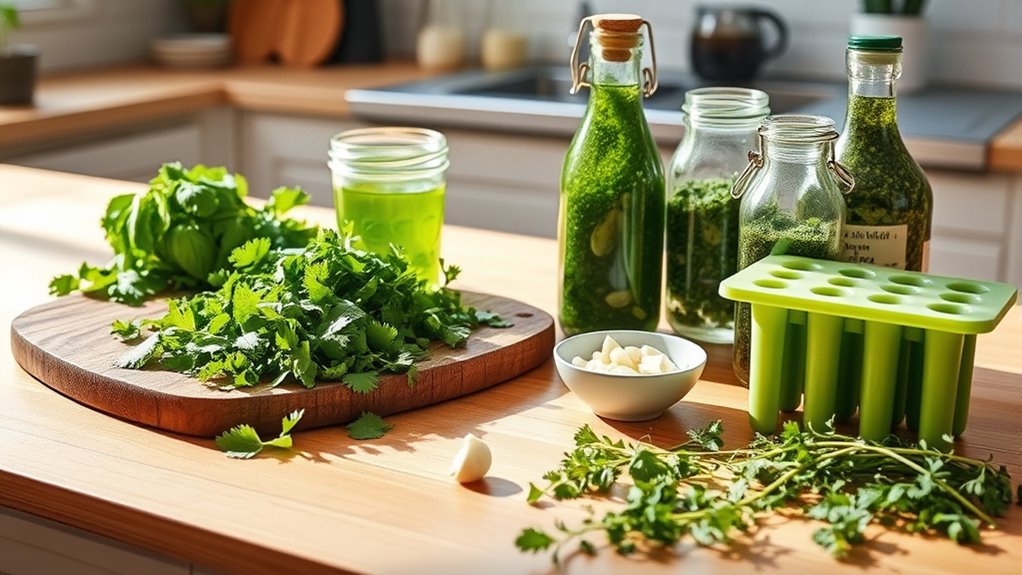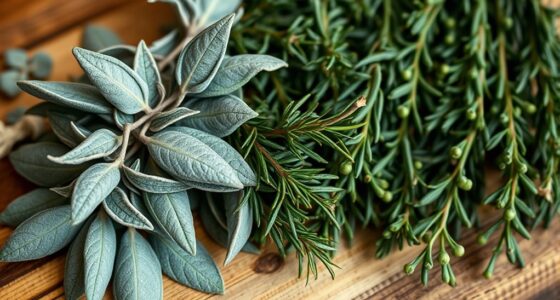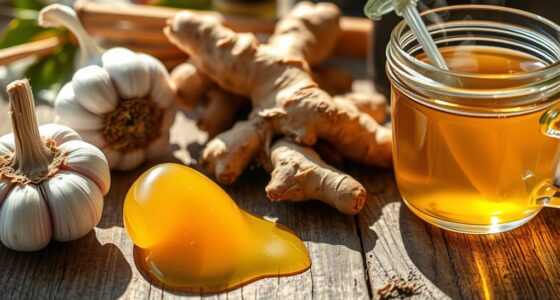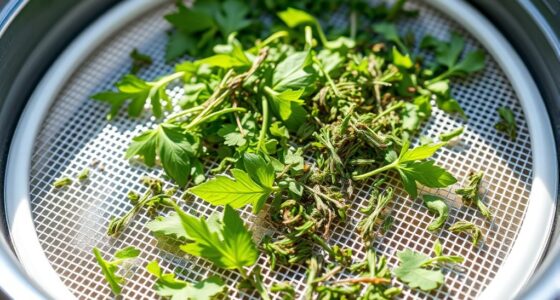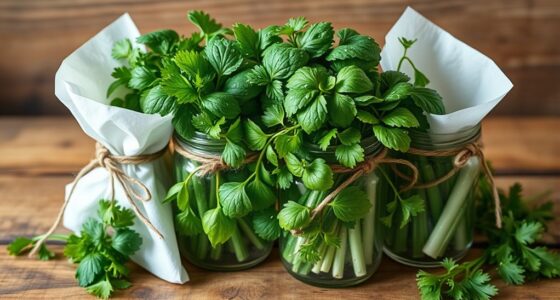To make the most of leftover herbs, try turning them into flavorful pestos by blending herbs with garlic, nuts, Parmesan, and olive oil, then store in the fridge or freeze for later use. You can also freeze chopped herbs in oil in ice cube trays to preserve their flavor and make cooking easier. Proper storage, like wrapping herbs in damp paper towels and sealing tightly, keeps them fresh longer. Continue exploring more ideas to maximize your herbs.
Key Takeaways
- Make herb pesto by blending herbs with garlic, nuts, Parmesan, and olive oil, then store in the fridge or freezer.
- Freeze chopped herbs in oil using ice cube trays for quick, flavorful additions to dishes later.
- Wrap fresh herbs loosely in a damp paper towel and store in airtight containers to extend freshness.
- Dry herbs for long-term storage, preserving their flavor for future use.
- Incorporate leftover herbs into soups, stews, sauces, or scrambled eggs for instant flavor enhancement.
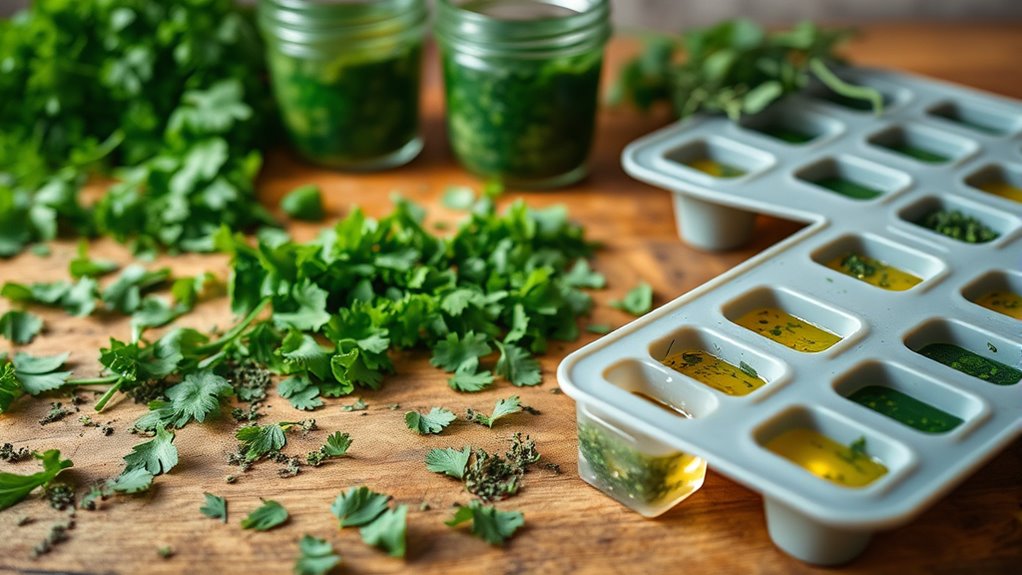
Leftover herbs can be a treasure trove for flavor, but many people end up tossing them out instead of making the most of their freshness. To truly maximize their potential, you need to master some simple herb storage tips and get creative with your herb recipes. Proper storage can extend the life of your herbs and keep their vibrant flavor intact, so don’t just leave them out on the counter or in the fridge’s crisper. Instead, wrap them loosely in a damp paper towel and place them in a resealable plastic bag or airtight container. This method helps prevent wilting and mold, keeping your herbs fresh longer. Alternatively, if you have a bunch of herbs that you won’t use immediately, consider drying them or freezing them in oil, which opens up a world of creative herb recipes. Using herb preservation techniques can help you maintain the herbs’ flavor and nutritional value for longer periods. Making herb pesto is one of the easiest and most delicious ways to preserve leftover herbs. Whether it’s basil, parsley, cilantro, or dill, blending herbs with garlic, nuts, Parmesan, and olive oil creates a flavorful spread or dip that can be stored in the fridge for a week or frozen for months. Pesto not only boosts pasta dishes but also adds a fresh kick to sandwiches, grilled meats, and vegetables. If you’re short on time, simply toss chopped herbs into soups, stews, or scrambled eggs for an instant flavor upgrade. These are quick, creative herb recipes that make use of what you have on hand without wasting any. Another fantastic way to preserve herbs is by freezing them in oil. Chop the herbs finely and pack them into ice cube trays, then cover with olive oil. Once frozen, transfer the cubes to a sealed bag or container. These herb-oil cubes are perfect for dropping straight into sauces, sautés, or roasting vegetables, infusing dishes with fresh flavor while saving you time in the kitchen. This method works especially well with rosemary, thyme, and oregano. Plus, it helps you avoid the common problem of herbs going bad in the fridge.
Frequently Asked Questions
How Long Can I Store Leftover Herb Pesto in the Fridge?
You can store leftover herb pesto in the fridge for up to a week. To maximize herb preservation, use airtight herb storage containers that prevent spoilage and retain flavor. Make sure to cover the pesto with a thin layer of olive oil to slow oxidation. Always check for signs of spoilage before using, like an off smell or mold. Proper storage techniques help you enjoy your pesto longer.
What’s the Best Way to Thaw Frozen Herb Oil Cubes?
To thaw frozen herb oil cubes, simply transfer them to the fridge and let them thaw slowly overnight for best Herb oil thawing results. If you’re in a hurry, you can also place the cubes in a sealed bag and submerge them in cold water. This method helps preserve Pesto preservation qualities by avoiding rapid temperature changes that could compromise flavor and texture.
Can I Reuse Leftover Herb-Infused Oil for Cooking Later?
Sure, you can reuse leftover herb-infused oil for cooking later—who knew, right? Just keep in mind, herb oil reuse can slightly diminish flavor preservation over time. To maximize its potential, store it properly and use it within a week or two. Ironically, that means your flavorful herb oil can still add a delicious touch to salads, sautés, or marinades, giving new life to your culinary creations without waste.
Are There Herbs That Don’T Freeze Well in Oil?
Some herbs don’t freeze well in oil due to their delicate structure, which can become mushy or lose flavor. Herbs like basil, dill, and parsley are more prone to freezing limitations when preserved in oil, so you might want to dry or freeze them separately. Stronger herbs like rosemary and thyme hold up better in oil, making them ideal for herb preservation. Always test small batches to find what works best for you.
How Can I Tell if Leftover Herbs Are Still Good to Use?
Think of your herbs as tiny treasures; if they look vibrant and smell fresh, they’re still good. Check for herb freshness by inspecting for mold detection—discard any herbs with fuzzy spots or off smells. Feel free to taste a small piece; if it’s bitter or dull, it’s time to let go. When herbs stay bright and fragrant, they’re your culinary gems ready to enhance your dishes.
Conclusion
By using leftover herbs creatively, you prevent waste and add fresh flavor to your meals. Freezing herbs in oil or making pesto are simple ways to preserve their vibrant taste. Did you know that Americans throw away about 103 pounds of food annually? So, by storing herbs properly, you not only save money but also help reduce waste. Next time you have extra herbs, get inventive—you’ll be surprised how much flavor you can preserve for later!
